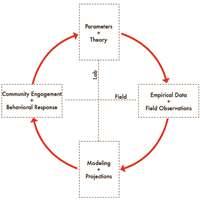Resilient Homes Online Design Aide: Connecting Research and Practice for Socially Resilient Communities

This project focused on urban resilience by addressing the existing urban fabric of repetitive, residential buildings that architects have historically neither designed nor studied. Through a data-model developed from publicly available information, this tool was created to simulate comfort, energy use, response to natural hazards, and more.
Resilience in architectural research, discourse, and practice tends to focus on physical aspects of the built environment. Much of the discussion within this technological domain of resilience resolves around singular, unique, and high-value facilities, ignoring the vast fabric of buildings where most people live. However, studies in socioecological resilience suggest that resilience in the built environment must address people and systems, not merely property. Transitioning to this focus will both require and result in broadening architecture’s interest and influence beyond the normal physical boundaries of the built environment. To effectively engage this broader scope, new tools can enable new modes of public outreach, information sharing, data analysis, decision support, and ultimately create new knowledge.
This paper describes the motivation, development, and preliminary findings of one such tool, the Resilient Home Online Design Aide (RHOnDA). The results suggest a cycle of participatory architectural research to advance socioecological resilience.


Add comment
Log in to post comments